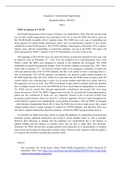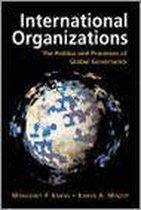Assignment 5 International Organizations
Samantha Nijboer- 2078352
WHO
WHO in response to COVID
The Health Organization of the League of Nations was established in 1920. After the second world
war, all other health organizations were absorbed by the UN, to form the WHO and with it came the
first World Health Assembly with 61 member states. The WHO was a new way of controlling and
being prepared for global health emergencies and to have an international response. It has already
contributed to many health projects. The COVID outbreak, which began in December 2019, created a
massive issue, and the responsibility to control this epidemic, was up to the WHO. This paper will
assess and grade the WHO’s response to the COVID pandemic on a scale of one to ten.
The beginning of the COVID crisis was when the Chinese government reported its first cases with
an unknown virus on December 31st , 2019. This was thought to be a viral pneumonia virus. After
China’s report, the WHO were obligated to respond to this outbreak and investigate. The WHO
established an Incident Management Support Team for disease outbreak on January first, 2020. Three
weeks later on January 22nd , the Director General called in an emergency committee to debate the
scale and potential risks of the COVID epidemic, but they were unable to reach a consensus due to a
lack of information. The COVID epidemic, nevertheless, was deemed a public health emergency by
the WHO eight days later (Die Zeit, 2020). For weeks after that, the WHO teams in Geneva and 150
country offices were collecting data to find a way to advise member states (Die Zeit, 2020). However
this approach was way too slow. The WHO was limited in their ability to quickly tackle this problem
due to multiple reasons. First of all, the WHO did not have much financial independence or authority.
The WHO receives around 80% through unpredictable contributions and around 20% from large
donors (Economist, 2020). The WHO’s biggest donor was the US, and when the Trump administration
pulled out, this withdrawal of funds was very impactful. Second of all, to prevent COVID from
becoming a global disaster, there was need for a collective approach. However states throughout the
world wanted to operate more independently, giving global governance—like the WHO, for example
—little influence (Independent Panel, 2021). Since the WHO does not have much power, they cannot
compel member states to adopt strategies to combat the COVID epidemic, and therefore China was
also able to suppress information about the pandemic, without the WHO saying anything about it.
To conclude, the WHO took many actions to combat the pandemic, by organizing government and
assistance groups, gathering information and trying to advise member states as well as possible.
However their efficiency in dealing with the pandemic was compromised due to the absence of
reliable funding and the reliance on member states who are free to make their own decisions.
Therefore, the WHO did not have enough authority both financially as in accountability to member
states which lead to them not being able to achieve much. However, their response would be graded a
6.5, because they still did everything they possibly could.
Sources:
- The Economist The world needs a better World Health Organisation. (2020). Retrieved 20
September 2022, from https://www.economist.com/international/2020/09/12/the-world-needs-
a-better-world-health-organisation






